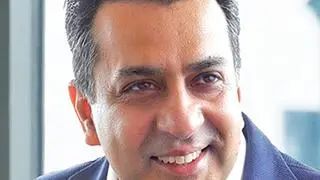Sunil Jose has a wealth of experience in turning around the India units of multinational technology companies. In a career spanning 20 years, he has held leadership roles in Oracle, Sybase and IBM.
Five months ago, Jose came on board data warehousing company Teradata Corp as Managing Director for India. He has already carved out a strategy to further make inroads into India’s burgeoning market.
“We are pushing ourselves to new segments such as government, utilities, retail and so on…In addition, we are investing in the ecosystem, partners and systems integrators,” Jose said. In a free-wheeling chat with BusinessLine , Jose shares his vision for Teradata India. Edited excerpts:
What motivated you to join a company like Teradata?
I have worked at large and mid-size organisations at various intervals. Oracle was a fantastic company which had a lot going for it. On the other hand, Teradata is a different ballgame. It’s close to the $3-billion-revenue mark, ideally positioning it for the next phase of growth. What Teradata has done in the last 12 months shows that the company is on the right track. We acquired some assets in the marketing applications and cloud arena at a time when the data warehousing space was exploding. Five years back, data warehousing was just a boardroom concept. I guess that was the kind of list that I was looking for.
Though it’s only been five months, could you articulate the changes you are trying to drive at Teradata since coming on board?
I would prefer to talk about what we are doing to enhance the market place. Traditionally, we have been very strong in financial services, manufacturing and telecommunications. Rapid adoption of new technologies happens in these three segments because of their deep involvement with customers.
On the other hand, retail, healthcare, e-commerce and IT/ITeS are all looking at the next trajectory of growth. So, the focus is to consolidate and enrich our position in the traditionally strong segments, while pushing ourselves to explore new arenas in which we are investing time, energy and people. We also wish to heighten our exposure around the entire ecosystem of partners and system integrators.
What is the hiring outlook like for the company in India?
In India, we have about 1,600 people and that’s a number which is growing. I could probably give you an indication by saying that we are adding a lot more of real estate. In the time that I have been at Teradata, we have added at least 300 more seats. So, hiring will definitely happen. I don’t think there will be a conservative approach to the whole thing.
It’s been over 130 days since the new government took office at the Centre. Are you seeing an improvement in the business climate?
Definitely, the optimism is there. However, 130 days is too short a duration to say that there is a lot of business on the street and that people are just going to pick it up. However, every market indicator points to the pent up demand for investments. Companies are now looking at new projects. A year ago, most of the discussions were centred about keeping the lights on. How well can we optimise? Where can we save money for new projects? Today, the discussion has shifted to what benefit will accrue if we do new projects. I don’t think companies are looking to cut corners any more.
How much of traction is there for Teradata in the e-governance space? Several state-run data centres now wish to move to the cloud, though they were not built for the cloud in the first place…
Anything to do with data centres, aggregation and so on would be of interest to Teradata. Is the government looking to move to the cloud? The answer is yes and no. The establishment may not be keen to build massive data centres like before, but they would want to hold on to some of their assets. They’ll probably go in for a hybrid model which is where the entire concept of Big Data comes into the picture. The good part is that the new government is trying to fast-track some of these initiatives.
Does Teradata India also pursue opportunities in other South Asian countries such as Sri Lanka, Bangladesh, Myanmar and Nepal?
We are working on opportunities in Sri Lanka and Myanmar. As opportunities arise, we will engage in these countries. Many of these markets are at the cusp of opening up. However, we do not have a direct presence there.
How bullish is Teradata’s top management on the India unit? Going forward, will the parent make significant commitments to Teradata India?
Teradata is looking at India from a growth trajectory point of view. There is a huge interest in what we need to get done. Discussions at the senior level centre on how we can take the India unit to the next level. Let’s not forget that Teradata has a strong workforce here in India. It would be a shame if we do not have significant exposure to this market. I don’t think any company can be successful here by solely looking at India as a sourcing destination. That’s definitely not what we are here for.








Comments
Comments have to be in English, and in full sentences. They cannot be abusive or personal. Please abide by our community guidelines for posting your comments.
We have migrated to a new commenting platform. If you are already a registered user of TheHindu Businessline and logged in, you may continue to engage with our articles. If you do not have an account please register and login to post comments. Users can access their older comments by logging into their accounts on Vuukle.